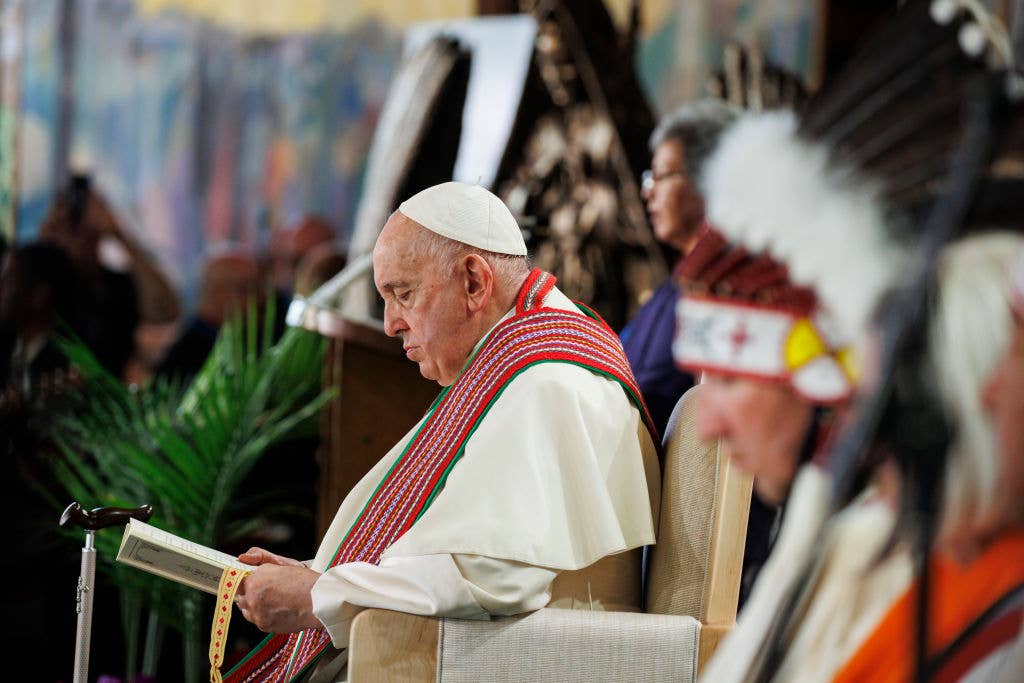
Catholic Church Considers Meat-Free Fridays to Help the Climate
Could a centuries-old practice help fight climate change? New research from the University of Cambridge says yes, claiming that with Pope Francis' encouragement, environmental footprints all around the world would lessen. The research found that if the pope reinstated Meat-Free Fridays in the Catholic church, millions of metric tons of greenhouse gas emissions would be saved globally.
Catholic bishops in England and Wales requested that their congregations give up meat on Fridays in 2011, but only a quarter of Catholic practitioners removed the meat from their diets. However, the study notes that this small change cut 55,000 metric tons of carbon annually.
“The Catholic Church is very well placed to help mitigate climate change, with more than one billion followers around the world,” Professor Shaun Larcom, the study's lead author and researcher at Cambridge’s Department of Land Economy, said in a statement. “Pope Francis has already highlighted the moral imperative for action on the climate emergency, and the important role of civil society in achieving sustainability through lifestyle change.”
Meat-Free Fridays date back to Pope Nicholas I's declaration in the 9th century to forgo meat consumption on Fridays in memory of Christ's death and crucifixion. However, in recent history, this practice has dwindled. The research team from the University of Cambridge sought to understand just how beneficial this declaration and practice could be today as the world faces the worsening climate crisis.
While this proclamation calls for the reduction of meat, it still allows for the continued consumption of fish and other animal-based foods such as frogs and turtles. For decades, American Catholics followed this practice so closely that it resulted in McDonald's Filet-o-Fish.
Eating Plant-Based to Save the Planet
The research team examined survey data with previously conducted diet and social studies to understand how the Catholic church could play an instrumental role in reducing greenhouse gases globally.
Larcom and his team found that 28 percent of Catholics in England and Wales changed their diets on Fridays, with 41 percent saying they stopped eating meat on Friday and 55 percent claiming they tried to eat less meat that day. The seemingly small change resulted in significant changes in the region's carbon footprint. Assuming the Catholics maintained this diet, the researchers found that this results in about 875,000 fewer meat meals per week, saving 55,000 metric tons of carbon every year.
“Meat agriculture is one of the major drivers of greenhouse gas emissions. If the Pope was to reinstate the obligation for meatless Fridays to all Catholics globally, it could be a major source of low-cost emissions reductions,” Larcom said. “Even if only a minority of Catholics choose to comply, as we find in our case study.”
With these results, the research team also extended the finding to propose that an international Meat-Free Friday could have tremendous benefits to the planet. The researchers noted that if Catholic bishops across the United States request their congregation to give up meat on Fridays, the benefits for the environment could be twenty times more than in London and Wales.
“Our results highlight how a change in diet among a group of people, even if they are a minority in society, can have very large consumption and sustainability implications,” Dr. Po-Wen She, a fellow of Cambridge’s Department of Land Economy and study co-author, said.
The Pope Encourages Young People to Care About the Planet
This July, Pope Francis urged young consumers worldwide to eat more plant-based for the planet in a letter released to the EU Youth Conference in Prague. His letter addressed a hope that younger generations who share a desire to create a kinder, better future can do so for the planet. He claims there is an urgent need to reduce reliance on fossil fuels and meat consumption, which he deemed "superfluous."
“I would like to tell you something that is very close to my heart. Above all, I invite you to transform the ‘old continent’ into a ‘new continent,’ and this is only possible with you,” Pope Francis stated in his letter. “I know that your generation has some good cards to play: You are attentive young people, less ideologized, accustomed to studying in other European countries, open to volunteering, and sensitive to environmental issues. This is why I feel there is hope.”
For more planetary happenings, check out The Beet's Environmental News.
More From The Beet






